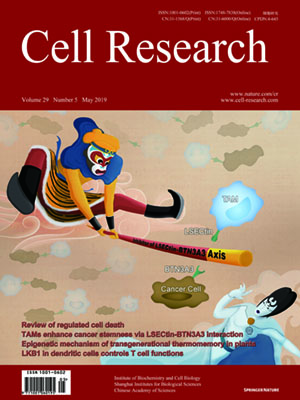
Volume 29, No 5, May 2019
ISSN: 1001-0602
EISSN: 1748-7838 2018
impact factor 17.848*
(Clarivate Analytics, 2019)
Volume 29 Issue 5, May 2019: 406-419
ORIGINAL ARTICLES
LKB1 expressed in dendritic cells governs the development and expansion of thymus-derived regulatory T cells
Leonard R. Pelgrom 1 , Thiago A. Patente 1 , Alexey Sergushichev 2 , Ekaterina Esaulova3 , Frank Otto1 , Arifa Ozir-Fazalalikhan 1, Hendrik J. P. van der Zande 1 , Alwin J. van der Ham 1 , Stefan van der Stel1 , Maxim N. Artyomov 3 and Bart Everts 1
1 Department of Parasitology, Leiden University Medical Center, Leiden, The Netherlands; 2Computer Technologies Department, ITMO University, Saint Petersburg, Russia and 3Department of Pathology and Immunology, Washington University School of Medicine, St. Louis, USA
Correspondence: Bart Everts (b.everts@lumc.nl)
Liver Kinase B1 (LKB1) plays a key role in cellular metabolism by controlling AMPK activation. However, its function in dendritic cell (DC) biology has not been addressed. Here, we find that LKB1 functions as a critical brake on DC immunogenicity, and when lost, leads to reduced mitochondrial fitness and increased maturation, migration, and T cell priming of peripheral DCs. Concurrently, loss of LKB1 in DCs enhances their capacity to promote output of regulatory T cells (Tregs) from the thymus, which dominates the outcome of peripheral immune responses, as suggested by increased resistance to asthma and higher susceptibility to cancer in CD11cΔLKB1 mice. Mechanistically, we find that loss of LKB1 specifically primes thymic CD11b+ DCs to facilitate thymic Treg development and expansion, which is independent from AMPK signalling, but dependent on mTOR and enhanced phospholipase C β1-driven CD86 expression. Together, our results identify LKB1 as a critical regulator of DC-driven effector T cell and Treg responses both in the periphery and the thymus.
https://doi.org/10.1038/s41422-019-0161-8
FULL TEXT | PDF
Browse 1184


